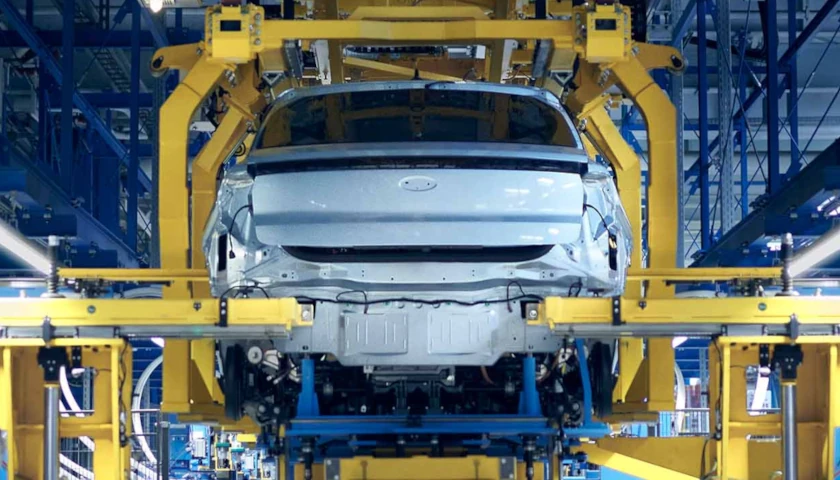by Michael Bastasch
The Federal Energy Regulatory Commission (FERC) broke a two-year partisan deadlock Thursday night to approve a liquefied natural gas (LNG) export terminal in Louisiana.
Top Department of Energy (DOE) officials said this was a major breakthrough that will alleviate a growing problem for U.S. energy producers — a lack of export infrastructure.
 “We have been promoting US energy around the world and today’s decision by the FERC is a very important one,” DOE Deputy Secretary Dan Brouillette told The Daily Caller News Foundation in an interview.
“We have been promoting US energy around the world and today’s decision by the FERC is a very important one,” DOE Deputy Secretary Dan Brouillette told The Daily Caller News Foundation in an interview.
The Calcasieu Pass LNG export terminal is the first such project to get FERC approval in two years. Republican FERC commissioners Neil Chatterjee, the chairman and Bernard McNamee worked with Democrat Cheryl LaFleur to hash out an agreement to get her support.
Chatterjee and McNamee needed LaFleur’s vote to approve Calcasieu Pass, which they secured after working out a new approach to account for greenhouse gas emissions from the export facility.
“This is a tremendous breakthrough,” DOE Under Secretary of Energy Mark Menezes told TheDCNF. “We hope it will serve as an analytical template going forward.”
Once complete, Calcasieu Pass terminal will export up 12 million metric tons of LNG a year. Brouillette said the project already has buyers, including in Europe, waiting for American natural gas.
Hydraulic fracturing and horizontal drilling spurred an oil and natural gas boom over the past decade, making the U.S. the world’s top hydrocarbon producer. However, a limiting factor on oil and gas is the lack of export terminals and pipelines.
Menezes said breaking FERC’s deadlock was also an important step in helping DOE improve its own LNG terminal approval process, including “making sure there’s no duplicative reviews.”
Getting approval to build an LNG export terminal is a long, complicated process that requires approval from multiple agencies. FERC currently has a backlog of a dozen LNG projects awaiting approval.
The Trump administration has been pushing for speedier approvals for LNG terminals, but FERC has been holding up the process amid pressure from environmental groups to factor global warming into its approval process.
LaFleur, for example, called on FERC to factor in estimates, like the controversial “social cost of carbon,” for a cost-benefit analysis. However, LaFleur agreed to compromise with her Republican colleagues.
Today’s order demonstrates that @FERC can act when commissioners are engaged and willing to compromise. I remain committed to moving our work forward, but will continue to consider each project on the merits.
— Cheryl LaFleur (@CLaFleurEnergy) February 22, 2019
FERC’s other Democratic commissioner Richard Glick opposed the terminal, arguing his colleagues were “deliberately ignoring the consequences that its actions have for climate change.”
The commission’s environmental review of Calcasieu Pass found the facility would emit roughly 3.9 million metric tons of carbon dioxide emissions a year — about 0.07 percent of total U.S. emissions.
Brouillette argued that while an individual LNG export terminal would emit greenhouse gases, it would help lower global emissions because countries want gas as an alternative to coal.
“To the extent that LNG is displacing coal around the world, we think the impact is going to be positive,” Brouillette said.
Brouillette also stressed the geopolitical implications of LNG exports and the role energy could play in President Donald Trump’s foreign policy.
“These are decisions that impact the president’s ability to make foreign policy decisions,” Brouillette told TheDCNF. “We get to assist Poland, we get to assist Lithuania, we get to assist the Baltic states.”
– – –
Michael Bastasch is a reporter for the Daily Caller News Foundation. Follow Michael on Twitter.
Photo “Donald Trump” by Michael Vadon. CC BY-SA 4.0. Background Photo “Federal Energy Regulatory Commission” by Ryan McKnight. CC BY 2.0.






These “green” FERC officials have delayed exporting clean burning natural gas to the rest of the world. Populations of other nations can just use coal or burn sticks to heat their homes or provide light. Possibly those other people will simply be denied benefits of light after sundown. Just make sure that there is reliable heat and light services for themselves. If others must suffer in the name of “green new deal”, so what?